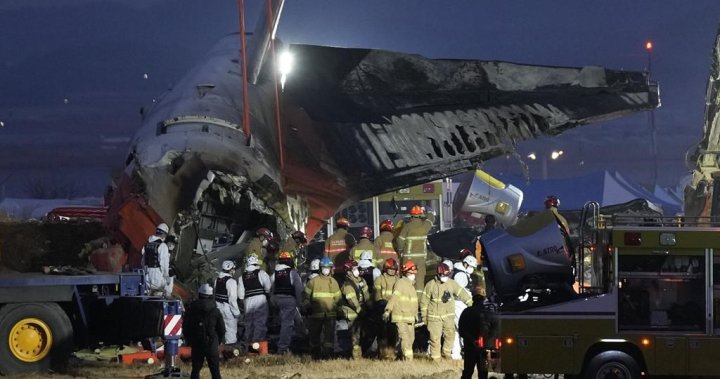A passenger plane skidded off the runway at a South Korean airport on Sunday, hit a concrete fence and burst into flames after the front landing gear apparently failed to work. All but two of the 181 people died in one of the country’s worst aviation disasters.
The Jeju Air plane crashed while landing in the town of Muan, about 290 kilometers south of Seoul. The Ministry of Transport said that the plane, a 15-year-old Boeing 737-800, arrived from Bangkok and that the crash occurred at 9:03 am.
South Korea’s fire agency said 179 people – 85 women, 84 men and 10 others whose gender was not immediately identified – died in the fire. Emergency workers pulled two people, both crew members, to safety. Health officials said they are conscious and not in a life-threatening condition.
Of the 177 bodies found so far, officials have so far identified 88 of them, the fire agency said. Most of the passengers were from South Korea, in addition to Thai citizens. The Thai Foreign Ministry said that its embassy in Seoul had received confirmation from South Korean authorities that the two Thai passengers were among the dead.
The fire agency deployed 32 fire engines and several helicopters to contain the fire. About 1,570 firefighters, police officers, soldiers and other officials were also sent to the site, according to the fire agency and the Ministry of Transportation.
Video footage broadcast by South Korean television channels showed the plane sliding across the airstrip at high speed, with its landing gear apparently still closed, overtaking the runway and colliding head-on with a concrete wall on the outskirts of the facility, causing chaos. explosion. Other local television stations broadcast footage showing thick plumes of black smoke rising from the plane, which caught fire.
Lee Jeong-hyun, head of the Muan Fire Station, said in a televised press conference that the plane was completely destroyed, with only the tail assembly remaining among the wreckage. Lee said workers are looking into various possibilities about the cause of the accident, including whether the plane hit birds.
Get breaking national news
For news affecting Canada and around the world, sign up to get breaking news alerts delivered to you right as they happen.
Transportation Department officials later said their initial assessment of communications logs showed that the airport’s control tower issued a bird strike warning for the plane shortly before it was intended to land and its pilot gave permission to land in a different area. Officials said the pilot sent a distress signal shortly before the plane overshot the end of the runway and skidded through a buffer zone before colliding with the wall.
Workers have recovered flight data and cockpit voice recorders for the plane’s black box, which will be examined by government experts investigating the cause of the accident and fire, said Jo Jung-wan, a senior official with the Ministry of Transport. He said it could take months for investigators to complete their investigation. The ministry said that the runway at Muan Airport will be closed until January 1.
Thai Prime Minister Paitongtarn Shinawatra expressed her deep condolences to the families of those affected by the accident in a post on the social media platform X. Baitungtarn said she had ordered the Foreign Ministry to provide assistance immediately.
Kirati Kejmanawat, Thailand’s director of airports, confirmed in a statement that Jeju Air Flight 7C 2216 departed from Suvarnabhumi Airport without any reports of abnormal conditions on the plane or on the runway.
In a statement, Jeju Air expressed its “deep apologies” for the incident and said it would do its “utmost to manage the effects of the incident.”
In a televised news conference, Kim Ee-bae, president of Jeju Airlines, bowed deeply to other senior company officials when he apologized to the bereaved families and said he felt “fully responsible” for the accident. Kim said that the company did not identify any mechanical problems with the plane after conducting periodic checks, and that he would wait for the results of government investigations into the cause of the accident.
Family members wept as officials announced the names of some of the victims in a lounge at Muan Airport.
Boeing said in a statement on the X website that it is in contact with Jeju Air and is ready to support the company in dealing with the incident.
Boeing said: “We extend our deepest condolences to the families who lost loved ones, and our thoughts remain with the passengers and crew.”
The incident comes as South Korea is embroiled in a massive political crisis sparked by President Yeon Suk-yeol’s stunning imposition of martial law and subsequent isolation. Last Friday, South Korean lawmakers removed acting President Han Dak-soo and suspended his duties, prompting Deputy Prime Minister Choi Sang-mook to take office.
Choi, who traveled to the site in Muan, called on officials to use all available resources to find the missing people and identify the victims as soon as possible. The government declared Muan a special disaster area to provide assistance to the families of the victims and set a week-long national mourning period until Saturday.
Yoon’s office said his chief secretary, Chung Jin-suk, chaired an emergency meeting among senior presidential staff to discuss the incident and informed Choi of the details. Yoon expressed his condolences to the victims in a Facebook post.
The Muan crash is one of the deadliest disasters in South Korean aviation history. The last time South Korea suffered a large-scale air disaster was in 1997, when a Korean Air plane crashed in Guam, killing all 228 people on board. In 2013, an Asiana Airlines plane crashed while landing in San Francisco, killing three people and injuring about 200 others.
Sunday’s accident was also one of the worst crash landings since the July 2007 crash that killed all 187 people on board and 12 others on the ground when the Airbus A320 skidded off a Sao Paulo airstrip and crashed into a nearby building, according to the data. Compiled by the Aviation Safety Foundation, a non-profit group aimed at improving air safety. In 2010, 158 people were killed when an Air India Express plane overshot the runway in Mangalore, India, and crashed into a valley before bursting into flames, according to the safety foundation. World leaders expressed their sympathy with South Korea’s handling of this tragedy.
During an Angelus prayer in St. Peter’s Square in Rome, Pope Francis said he was joining in “praying for the survivors and the dead.” Japanese Prime Minister Shigeru Ishiba said he was “deeply saddened by the loss of so many precious lives” in a letter published by the Japanese Foreign Ministry. Ukrainian President Volodymyr Zelensky said on the X program that “every life lost is a priceless tragedy” and that he offered his “heartfelt condolences” on behalf of the Ukrainian people and himself.
—With files from The Associated Press’s Bobby Kaina Kalvan, Shalida Ekvitthayavishinkul, Gintamas Saksurnchai, Mari Yamaguchi and Giada Zampano
& Edition 2024 The Canadian Press




